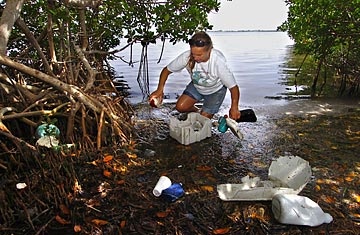
Maya Totman of Florida Keys Wildlife Rescue hopes to keep the oil spill from mixing with garbage because of the deadly impact that could have on the local wildlife
(2 of 2)
Local boat captain George Bellenger and others set up a series of town-hall meetings at Sippin' Internet Café on Eaton Street, the last of which was attended by both Coast Guard and BP reps. It was at 8 p.m. on a Friday, traditionally not the soberest hour of the week in Key West, and Bellenger had called the Key West police department to see if it would help keep the peace. In the end, the police didn't come. Bellenger had to throw one person out for "not showing respect to our [BP] guest," but it was an otherwise calm event.
In May, Bellenger had heard through word of mouth ("the coconut telegraph," as it's known here) about a closed meeting between city officials and BP representatives and others. He and a few others showed up to complain about the lack of preparation and left with a promise that BP would pay $10,000 to fund hazardous-materials training for 100 people. It was, says Bellenger, one of the "two good things" that has happened with BP. The other: a towboat operator out of Big Pine Key was recently hired to be a sentry boat, keeping an eye out for approaching oil to the west of the Keys.
But everyone else is on their own for now. The Hazwoper haz-mat training that is a pre-requisite for handling oil spills can cost hundreds of dollars per person (although KeysSpill.com has arranged a discounted online course for $69). Florida Keys Community College offered a sold-out bird-cleaning course this past weekend, giving Keys residents practice on dead seabirds. But that course cost $150 per person and was not paid for by BP.
Advance planning would benefit BP as well: the Keys' coral-reef ecosystem is unique and would require a different approach than the coastal marshes and beaches to the north. For example, chemical dispersants, already controversial in the northern Gulf, would be far too toxic for the coral, says Dave Hallac, supervisory biologist at the Dry Tortugas and Everglades national parks. Additional worries about the potential impact that unwitting contractors could have on the Dry Tortugas National Park caused the park service to "pre-negotiate" with the Coast Guard to insure that there would be park service advisers working with the contractors.
The generic cleanup plans that existed before the spill will have to be reimagined as well. "The contingency plan we have with the Coast Guard is for the event of a tanker spill," says Rice. "I asked [the Coast Guard] directly, 'Do you have a contingency plan for oil at depth?' They don't."
Rice is pushing his own solution that might help protect the most sensitive reefs and mangrove plants from oil beneath the surface: curtains of air bubbles from perforated air hoses laid on the seabed. "It would at least deflect the smaller tar balls and push the oil up the surface," he says.
How receptive would the Unified Command be to trying out a clever hack like this from a local scientist? How much help would they accept from the captains who know the backcountry currents and channels best? If oil comes to the Keys, residents warn, BP had better be ready to work with them. "I just talked with BP yesterday," says Rice. "I told them flat out, 'If you come down here and start doing what you've done in Louisiana, you're going to have a revolt. They'll shut down U.S. 1. You won't be able to bring any of your contractors in or out.' " Key West's isolation may not protect it from the coming oil, but perhaps its independent streak will.
